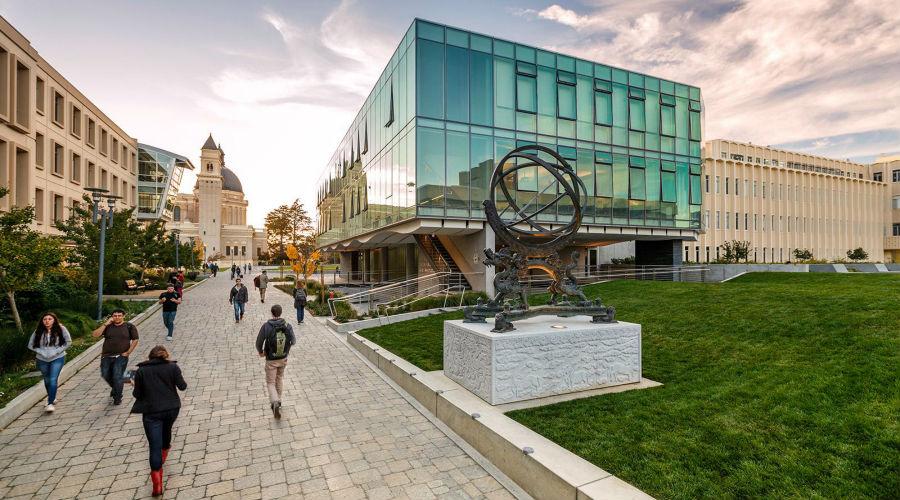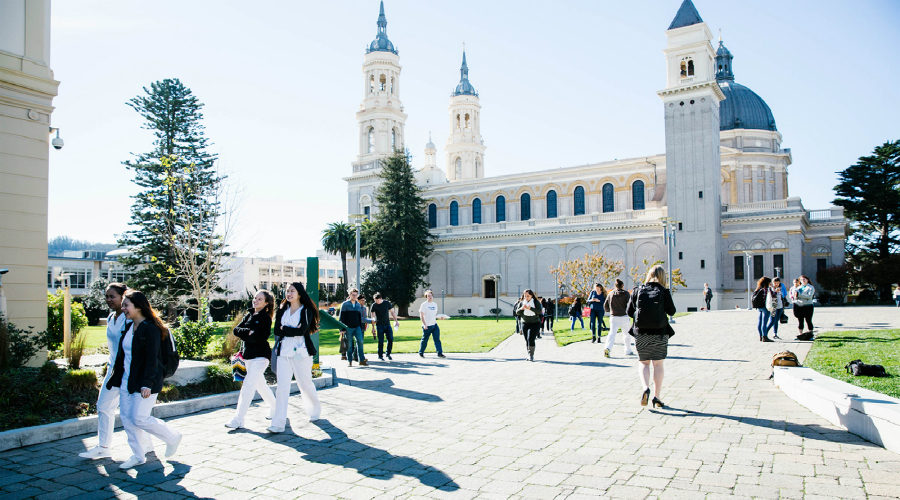Frequently Asked Questions
The program is a four-semester, 36-unit, two-year program for full-time students.
Part-time students who take two classes per semester may be able to finish in three years. This does not apply to F-1 visa-holding international students.
Each semester, following your first semester you will receive an email from the OneStop office that is sent to your USFConnect email address that will tell you when registration for the following semester will begin. Follow this link to the USF Academic Calendar (the right of screen under "Quick Links") which indicates your future registration dates as a continuing student.
Yes, perhaps a quarter of our students do the program this way. If you take an average of two classes per semester, students with adequate preparation can finish the program in three years.
Please note that the part-time option is not available for F-1 Visa-holding international students. For more information, please consult with the ISSS at isss@usfca.edu.
Our first cohort of students is entering in fall 2019, so we can't answer this question precisely yet. We are working in close consultation with the members of our advisory board and other economists in the tech sector to make sure that you get career-relevant training that will make you a desirable hire for a wide range of jobs in this sector and others that are learning how to take advantage of the digitization of the economy.
Students from the Economics Department's other master's programs have found exciting jobs at organizations including Facebook, Google, Intel, Y Combinator, USAID, Compassion International, Moody's, Quinstreet, and Edgeworth Economics. Several students each year go on to study PhDs and have been accepted at universities including UC Berkeley, UC Irvine, University of Wisconsin, Florida State University, and Simon Fraser University. Given the rare combination of skills we offer with this new program and our close proximity to and partnerships with growing tech firms in the area, we expect this trend of excellent placement to continue.
USF offers many excellent graduate courses that complement those offered within the economics department. Each course has its own enrollment procedures. For some courses you can enroll directly. For many high-demand courses you cannot, as most spaces are reserved for students enrolled in that graduate program. In those cases, the instructor may be able to make one or two seats available at his or her own discretion. They will also want to ensure that you have the preparation needed to succeed in the course.
Once you have received permission to take the course, you should get a copy of the syllabus and meet with the Program Director. Permission to count the course as an elective will depend on how well it fits with the economics curriculum and program objectives.
Typically, full-time graduate students take between 9-12 units per semester. Succeeding in a graduate course requires much more time than is typically required for an undergraduate course. In addition, your ability to work as a teaching assistant on campus, to find good summer internships, and ultimately to place in a good job will depend significantly on your grades. It is better to take fewer units and get better grades than to take more units and have an unimpressive GPA.
The required first-semester courses are Econ 601 (Microeconomics), Econ 611 (Computation), and Econ 615 (Mathematics for Economists). Each of these courses is three units. You may also wish to take Econ 640 (Making Markets Work) or PC 680 (Graduate Program Writing).
For Econ 601 and Econ 615, you should take the sections offered by Professor Lau. The sections offered by Professor Anttila-Hughes (601-2) and Professor Cassar (615-2) are intended for students in the MS IDEC program and cover slightly different content.
You may be permitted to exempt out of a required course if you have a strong background in that area. Decisions will be made case by case in consultation with the Program Director, who will need to sign a form for you to submit to CASA.
Your request is more likely to be approved if you received an A or A- in a similar graduate-level course, you took the course less than five years ago, and you have already taken advanced courses that built upon that course.
In general, keep in mind that it is better to be the superstar and get an A in a course at USF because already know some of the material than it is to get a B because you jumped ahead to something you weren't quite ready for.
For Econ 611 (Computation for Economics), you may request to be exempted if you have taken at least one programming course, receiving a B+ or better, and you are already comfortable with Python.
USF does not provide summer internships. However, the booming San Francisco Bay Area provides many opportunities for those who actively seek them out.
Foreign students with F-1 visas who wish to pursue internships or other work experiences off campus will need to get authorization for Curriculum Practical Training (CPT). Please start this process as early as possible as the paperwork can be time consuming.
To get CPT authorization, you will need to enroll and pay tuition fees for a 1 unit internship course, Econ 696, supervised by a faculty member. You will need to obtain a CPT recommendation form and a directed study form, complete them, and provide them to the supervising faculty member to sign. The faculty member will need to submit an Econ 696 syllabus to the university. You will also need to obtain a letter from your employer.
These instructions are only for reference and may become outdated. Please read the instructions closely and check with USF International Student and Scholar Services (ISSS). ISSS is the authoritative source of information for all immigration and visa-related questions for USF students.
American students do not need permission from the department to take on internships or other work. There is no requirement for Americans to enroll in a for-credit internship class.


